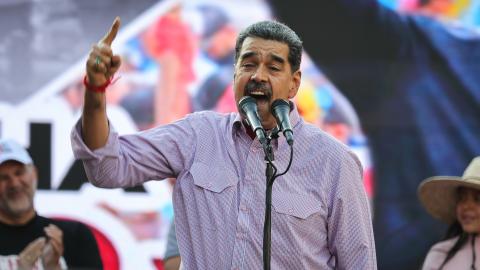With the addition of the Gerald R. Ford Carrier Strike Group to forces already deployed in the Caribbean, the United States has brought together the largest collection of military assets in the Western Hemisphere in years, creating the most direct challenge to the dictatorship of Nicolás Maduro since he came to power in 2013. What began as a counternarcotics operation is now shifting toward a different aim: encouraging the removal of Maduro from power.
Many analysts have argued against attempting regime change in Venezuela, but President Donald Trump has indicated he isn’t planning to effect regime change. Rather, he likely supports a “transition by other means” in which strikes on Venezuelan targets bring about a collapse of the regime or persuade people around Maduro to facilitate his exit. The more immediate questions are whether anticipated airstrikes can catalyze this type of change quickly, and if not, whether Trump will be willing to escalate a campaign beyond hitting initial targets.
While the U.S. forces in the Caribbean possess overwhelming striking power, Maduro might be able to withstand initial strikes. In 1999, following Serbia’s intensification of ethnic cleansing in Kosovo, NATO initiated an air offensive against Serbia, believing that a limited, short-term campaign would suffice to force Serbian president Slobodan Milosevic to back down. Instead, Milosevic dug in, and NATO had to expand the scope of bombing from purely military and air defense sites to strategic targets, including government buildings and civilian infrastructure and power grids.
The bombing was initially counterproductive, solidifying support for Milosevic and scattering opposition groups. It took 78 days of bombing, with approximately 1,000 military and over 500 civilian casualties, for Milosevic to agree to withdraw from Kosovo and agree to a peace plan. (And it wasn’t until 2000, 16 months after the bombing ended, that Milosevic ceded power after mass protests in which security forces declined to use force against protesters.)
Of course, the Serbian case is not predictive of what might happen in Venezuela, but it is suggestive of possible challenges, in particular the time component and the logic of escalation. And Maduro has important advantages: Cuban counterintelligence officers seeded throughout security forces to enforce loyalty and a vast network of regime-connected elites that profit from illicit activities or doing business with the government and have strong incentives to maintain the status quo.
In the event U.S. airstrikes failed to catalyze a move against Maduro, the U.S. would face difficult choices about whether and how to escalate, while the regime used the external threat to justify repression and rally nationalist sentiment, potentially solidifying cohesion within the regime. Such a scenario would test Trump’s resolve to avoid a larger commitment of U.S. forces. At the same time, suspending the attacks without achieving objectives would be a devastating blow to U.S. credibility.
Trump has sent mixed signals about attacking Venezuela. Given his reported hesitation about ordering strikes, there is a less risky option he could consider: maintaining the current military presence, without initiating strikes, while also exerting economic and other forms of pressure on Maduro. U.S. attacks on Venezuela immediately give the regime a powerful narrative of Maduro standing up to America, while more comprehensive pressure creates chronic pain for the regime and its allies without providing a unifying external enemy.
As for economic pressure, one place to start is squeezing the regime’s ability to export oil, by far its main source of revenue. It is incoherent to allow Chevron’s operations in Venezuela to continue to provide financial benefit to the regime, and canceling Chevron’s license to operate is an obvious first step. Beyond that, the administration could also intensify efforts to interdict Venezuelan oil exports to China and target the illegal gold trade that generates billions for the regime.
Over time, sustained pressure — military, economic, and covert — could create space for internal fractures to develop and for Venezuela’s democratic opposition to organize. A longer deployment, while expensive, would be less costly than conflict and preserve the administration’s flexibility to escalate or de-escalate based on circumstances.
Trump is right that Maduro’s criminality and the humanitarian catastrophe he has created warrant an aggressive response. But rather than gamble on a strategy that could require prolonged hostilities and a series of escalations, Trump should pursue a less dramatic but more sustainable option: maintain the threat of force in the region while also leveraging other forms of pressure. Intensify the pressure on Maduro — but don’t start a war the U.S. isn’t prepared to finish.


















